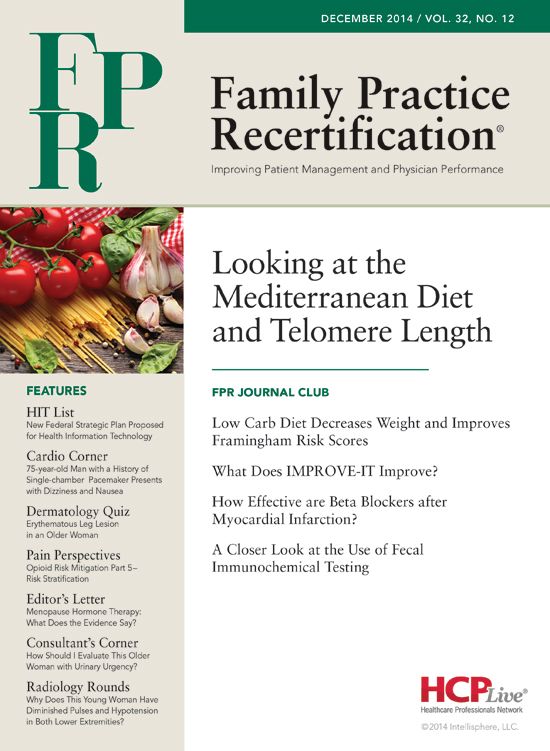What Does IMPROVE-IT Improve?
The highly publicized IMPROVE-IT trial was presented at the American Heart Association Scientific Sessions in mid-November. The conclusion of the study being that for those who are at the highest risk, like those who have suffered myocardial infarction, the combination of ezetimibe plus simvastatin lowered the risk of cardiovascular death, myocardial infarction, or stroke. The significance of this risk lowering is relatively minimal and despite years of research showing no benefit, this presentation was the first time when this drug combination resulted in a benefit.

Frank J. Domino, MD
Review
Methods:
Eighteen thousand patients who were post-acute coronary syndrome were randomized to either simvastatin 40mg/day or simvastatin 40mg/day combined with 10mg of ezetimibe. Patients were followed regularly over the next 7 years.
Results & Outcomes:
Those randomized to the simvastatn plus ezetimibe group had the combined outcome of cardiovascular death, MI, or stroke of 32.7%. For simvastatin alone that number increased to 34.7% (absolute risk reduction of 2% over 7 years). Adverse effects of the ezetimibe plus simvastatin were not more common than in those just taking simvastatin alone.
Conclusions:
The combination of ezetimibe plus simvastatin in patients who are post-acute coronary syndrome had a small but significant reduction in combined outcomes of cardiovascular death, MI, or stroke, compared to a low dose of simvastatin on its own.
Commentary:
Despite the fanfare and media attention paid to the study, little practice changing outcomes were demonstrated by the IMPROVE IT trial.
Ezetimibe was approved by the FDA in 2002 and marketed aggressively to help lower LDL levels in patients with hyperlipidemia and at risk for cardiovascular disease. Although LDL reductions was noted when this drug was added, no clinical outcomes were improved by the addition. Despite the over 500 prior publications on randomized controlled trials with this medication, none have demonstrated a clinical efficacy.
This study did not demonstrate a decrease in all cause mortality or even cardiovascular death. It did provide a 2% absolute risk reduction for the combined outcome of cardiovascular death, MI, or stroke with a number needed to treat at 50.
Nonetheless, this is not practice changing for a number of reasons. If this data is accurate, the absolute risk reduction of 2% means the vast majority (98%) of those who took it for 7 years received no benefit. Additionally, our current standard of care is not to use low dose simvastatin for those post-MI , but rather higher dose statins. In 2013, Merck, the drug’s manufacturer, received FDA approval for the combination of Ezetimibe and atrovastatin.
Although the drug provided no adverse patient side-effects, the cost of implementing it is quite high. On average this medication retails at about $7/day. This will result in a cost of over $17,000 for 7 years of implementation to prevent one of the combined outcomes. Compare this to cardiac rehabilitation, which has been studied by systematic review and found that it not only reduces cardiovascular endpoints, it decreases the risk of re-infarction by almost 50%, cuts cardiac mortality by about 35%, reduces all cause mortality by 25% (Am Heart J. 2011; 162 (4): 571-584) and is highly cost effective (approximately $700.00 J Cardiopulm Rehabil Prev. 2009 Nov-Dec;29(6):348-57).
The benefits of this medication are limited and require 7 years to pass for a population to see an improved outcome Be sure to have this level of discussion with patients before implementing this treatment regimen. And for those not exercising, refer post-MI to cardiac rehabilitation.
About the Author
Frank J. Domino, MD, is Professor and Pre-Doctoral Education Director for the Department of Family Medicine and Community Health at the University of Massachusetts Medical School in Worcester, MA. Domino is Editor-in-Chief of the 5-Minute Clinical Consult series (Lippincott Williams & Wilkins).
Additionally, he is Co-Author and Editor of the Epocrates LAB database, and author and editor to the MedPearls smartphone app. He presents nationally for the American Academy of Family Medicine and serves as the Family Physician Representative to the Harvard Medical School’s Continuing Education Committee.
